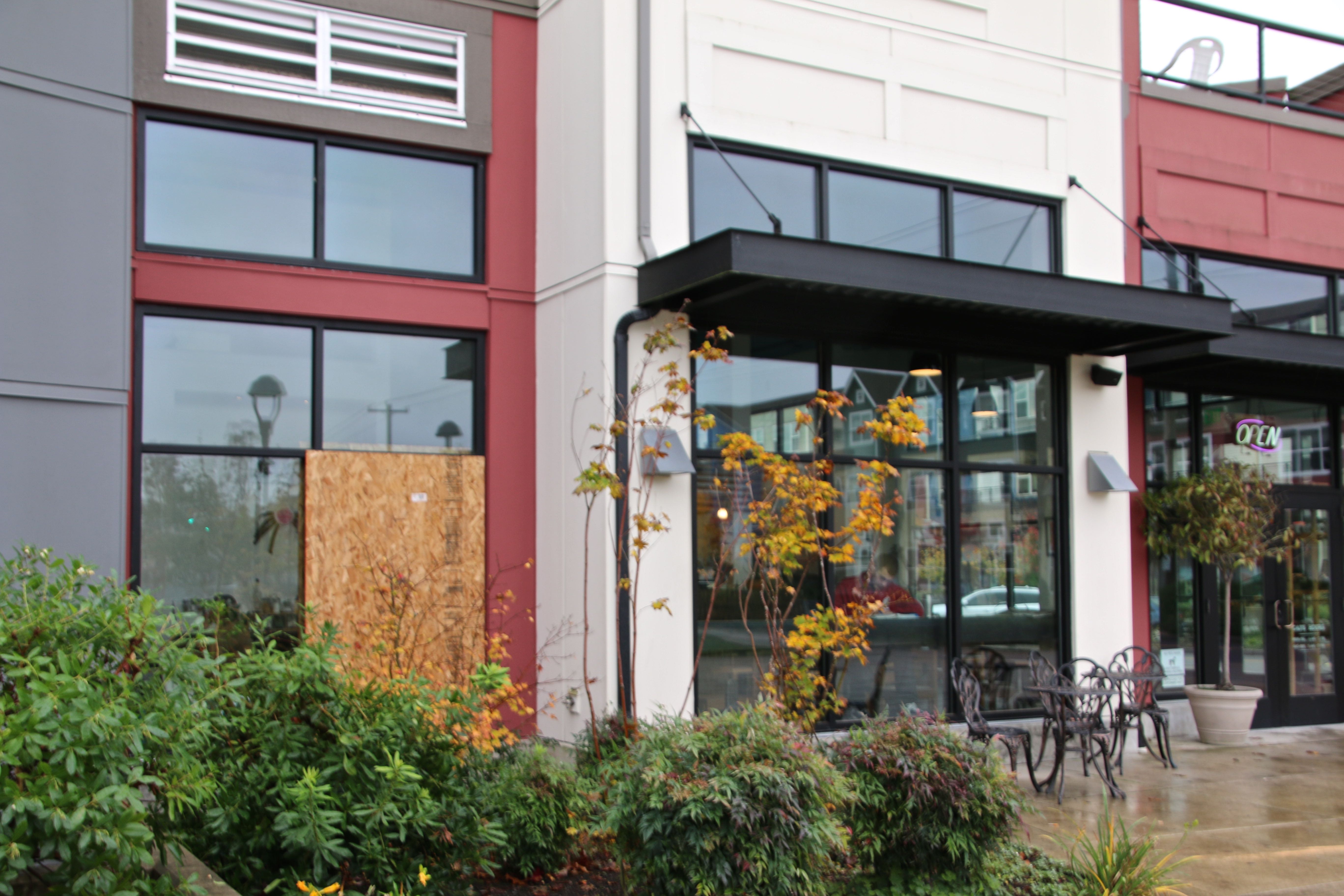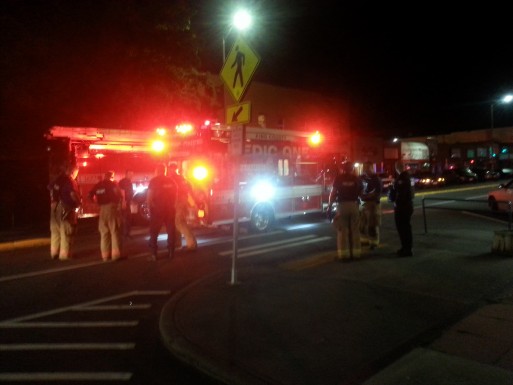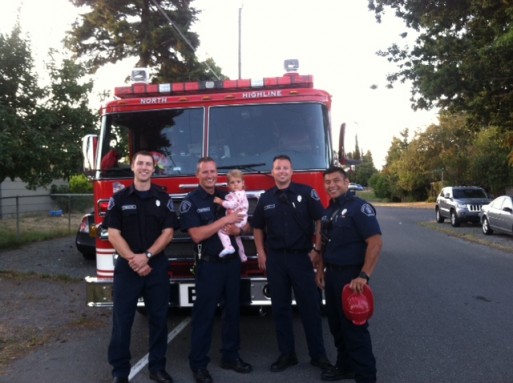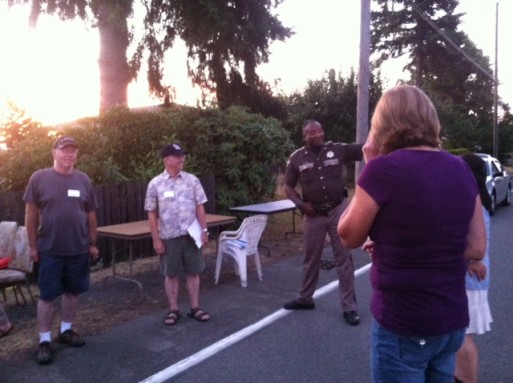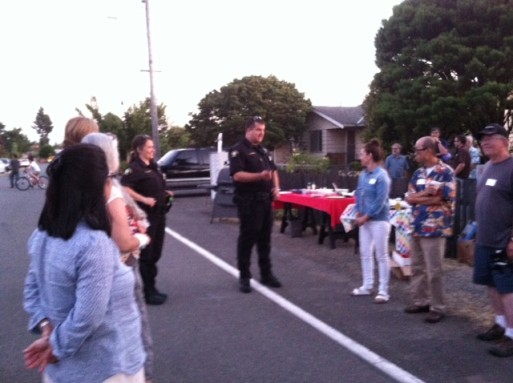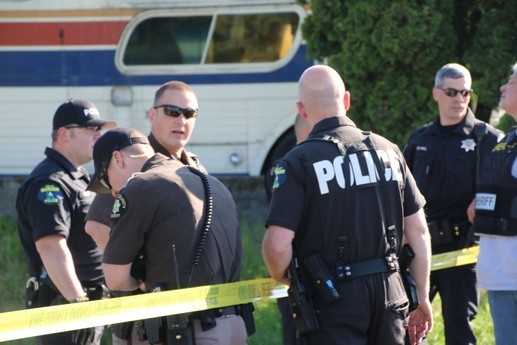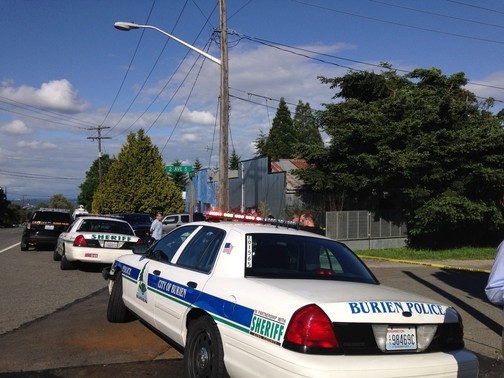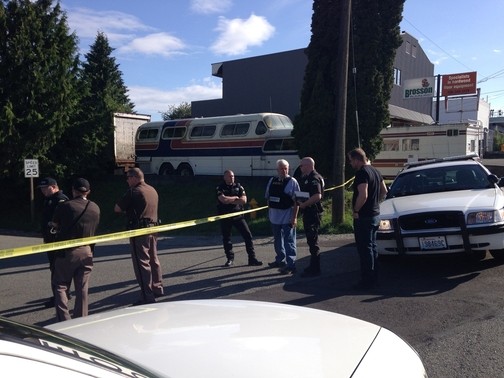
By Tracy Record
White Center Now editor
Tough to have a meeting during a big game – but the issues before the North Highline Unincorporated Area Council couldn’t wait, and its Thursday night meeting went on as scheduled, despite the Seahawks’ concurrent home opener (ending, just before the meeting ended, with fireworks exploded by fans somewhere, audibly, nearby).
The marquee guest was King County Sheriff’s Office precinct commander Major Jerrell Wills (photo above), speaking about changes in KCSO, including scheduling changes, and the storefront-deputy situation (as previously reported, Deputy BJ Myers has been promoted to a new role and is no longer in the storefront; West Hill, to the east, has lost its storefront deputy too).
Maj. Wills said two candidates initially had sought the North Highline position, and neither worked out; he posted the job again (along with West Hill) and had no applicants, so he reposted, and “still doesn’t have any interested applicants” though the second posting was about to expire.
He says, “I’m not inclined to just pick someone” – a community liaison is a position to which he doesn’t favor drafting an appointee, he says, so he plans to discuss it again with Sheriff John Urquhart – he will not repost it, but hopes the sheriff will be “open to some of my operational ideas.” But, he says, White Center does still have “what most communities don’t have” – a community service officer (Peter Truong).
Major Wills stressed repeatedly that the “storefront deputy” is not the only KCSO position that can respond to concerns. Asked about current staffing, 6 deputies are on in the area per shift – 2 on Vashon, 2 in White Center/North Highline, 2 in Skyway. That would be more, Maj. Wills said, except for the fact his precinct alone has eight vacancies – the personnel situation is not a budget problem, but a personnel shortage problem, he insisted, adding that retirements are hitting the KCSO hard; many are getting to 30 years of service. (He mentioned that he’s been serving for 26 years.)
“We’re fighting an uphill battle,” he said about the problem, “so now we’re in a situation we’re calling redeployment.” For example, detectives who might be in specialized areas are being “redeployed to supplant our lack of staffing just to keep us at six (in the precinct) each shift.” That’s been happening since July and the union has agreed to let them keep doing it through January – “just so we can get to minimum every day.” And yet the retirements and other departures keep coming, he said.
“If not for the (staffing shortage), would we have more deputies assigned to the community?” asked NHUAC president Barbara Dobkin. Yes, there would be more per shift, Maj. Wills said. “What would that number be?” he was asked, but he didn’t have the specific number. “Per shift you might have two to three additional people.”
The attrition/recruiting problems are not unique to KCSO, Maj. Wills said. He also pointed out that the process of going through the academy causes a fair number of dropouts. They want to fill the positions, he insisted, “it’s just a challenge.”
Council member Elizabeth Gordon then asked Maj. Wills about homelessness/graffiti problems in certain areas, and he said he didn’t know about those specific problems, but did have an update on the pond/bog area. “That’s been a source of homeless encampments for some time,” he said, for the entirety of the two years he’s been here. Now signage is posted “all over” to warn campers that clearing is coming – “signage everywhere to notify, you can’t be in here, this is not a campground. … That’s the first part, education,” he said. Next part is cleaning – “King County code enforcement has been actively partnering with us to clean up the hedges, etc.” The cleanup was expected to start the following day and “they’re going to cut a road” so deputies can drive into the area, he added.
Once it’s been cleaned up, “then we’re going to go in and identify the people who are in there illegally and serve them with written notice that ‘you, John Doe, are no longer able to come back here … you’ve been warned’.” Then Community Service Officer Truong will help with figuring out some possible services/referrals for the people who are there: “We can’t arrest our way out of this,” declared Maj. Wills, so they hope to find housing/services for campers rather than just hauling them off to jail.
Major Wills also brought up the recent White Center bicycle-corral meeting and said while he’s not voicing a position on the proposed parking configuration, he found it helpful to be at that meeting – held in the KCSO storefront – to hear community concerns such as fears about safety (and lack of it) in the alleys. He said he plans to do some foot patrol in the alleys – “not to make arrests (but to) survey some of the issues I’m hearing about, the homeless, alcohol- and drug-addicted people who are impacting residents of North Highline.”
Another attendee wondered about whether anything can be done to attract a business or traffic to the vacant grocery store at 1st/112th in Top Hat, because, she says, it’s become a magnet for trouble. Dobkin said she’s been in touch with the owner, a Bellevue resident, who told Dobkin she is getting ready to sell the site, which is why there was tank abatement recently.
All in all, Maj. Wills said that they’re just trying to do “something” about a variety of problems. But, the people now camping at the bog “are not going to just vanish,” he said, then quipping, “It would be great if they would just go to the north side of Roxbury.”
Asked about recurring graffiti problems, he said covering it up as fast as possible is vital, or else it might just attract more.
A Metro Transit Police deputy (that agency is part of the King County Sheriff’s Office), Bill Kennamer, spoke up after Maj. Wills departed. He said he is assigned to the general West Seattle/White Center/vicinity area. The trouble spots he has addressed include 15th/Roxbury – “we’ve pushed them away, and now we all know where they are, they’re in the valley. … I try to tackle transit-related community problems.” He said he had “come to an agreement” with people who had sat in bus stops drinking their beer. He said, “The bus system is better now than it was before.”
Asked if the Westwood Village transit concentration had made anything worse, he said he had a “problem-solving project” open for that area, visited it “dozens and dozens of times,” and “closed it” because “the problems there are not Metro problems, they are park problems.”
There was a question about new graffiti vandalism on the former restaurant property on 16th/Ambaum, and about vandalism painted on some of the commercial buildings in downtown White Center. In general, it was reminded, they need to get owners’ permission to clean up graffiti and other such problems on private property.
King County Councilmember Joe McDermott, who was in attendance, was asked if his office might have meetings, a regular meet-and-greet, or a regular presence in downtown White Center. He said it might not be efficient or ideal for his office to continuously be the filter for county issues, when county government has other agencies and reps who can work with the community directly. But, McDermott added, he was there because it’s helpful to hear about community concerns.
Council member Gordon, who had brought up the issue, said that made sense but she asked because the community seems “fractured” and CM McDermott could be a “unifying force.”
Overall, president Dobkin explained, “We have a lot of issues here, and people feel like we’re being abandoned,” due to various factors, including the ongoing unincorporated status. “I mean, there are people sleeping in my alley. … People think everything is great in White Center, but it’s not.”
WANT TO BE ON THE NHUAC BOARD? If you live and/or work in the area, you’re invited to be part of it. Contact Dobkin through the NHUAC website.
ANNOUNCEMENTS: First thing on the agenda at the meeting:
*Council member Gordon had just come from a community-development forum in SeaTac and said those involved would be happy to have input from North Highline, such as “What are the issues that we’re facing and what are some of the barriers or challenges in getting them addressed?” For example, she said, “… there’s a lack of connection between the county and what goes on in this area … in particular, homelessness, things that go on in the business district.” A survey is online; find it here. President Dobkin said that Valerie Kendall, from the group overseeing the forums, would be at NHUAC next month, and that the survey is open for people to voice needs such as sidewalks.
Gordon also addressed the bike-corral concerns in downtown White Center, mentioning that possible alternatives are being looked at so that “another proposal” could be put out. She said community members’ opinions are being sought as well. Dobkin said that since it seems to be controversial and divisive, regarding the corral possibly replacing two motorized-vehicle-parking spaces, she thinks NHUAC shouldn’t take a position. Council member Pat Price said she found it hard to believe 20 people would come to downtown White Center riding bicycles. Dobkin and an attendee who didn’t identify himself pointed out that some of those who participated at the meeting and expressed support for the bike corral weren’t from White Center but instead were from West Seattle.
*Gordon also mentioned the Roxbury SW road safety project that is in the works (led by the Seattle Department of Transportation) and pointed people to the proposals that had been discussed at recent meetings. Dobkin said she had been to the first of the two meetings and was concerned that much of the work seemed to be happening on the west end; Gordon pointed to some of the proposals for the east end.
*Council member Price mentioned the White Center Food Bank‘s gala is coming up next month.
From the community, Gill Loring brought up four homeless camps in the “bog” (Neighborhood Pond) area, and said that another clearing operation is apparently planned in the area. He is particularly concerned that camp residents’ waste is going into the water. He added that there’s word of someone sleeping in an alley near his house, and urged people to report to 911 if that sort of thing is found (and, he added, make sure the dispatcher is clear you’re talking about the county, not the city).
*Final announcement – Gordon said seamountathletics.com has information about local high-school sports and their need for community support.
Watch northhighlineuac.org for word of the next meeting.


